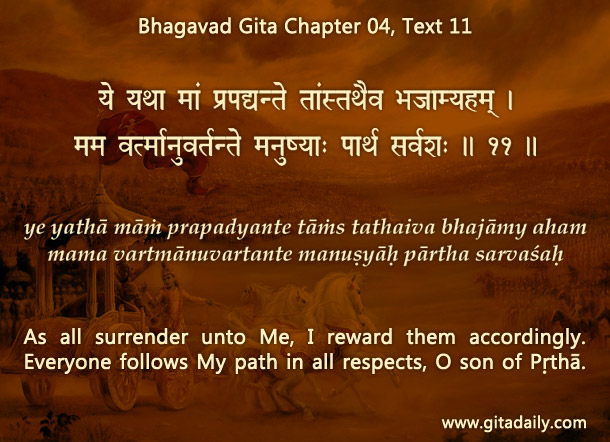If the followers of a tradition have internalized an exclusivist conception of the Divine, then they will see those who don’t worship their God as at best misled and at worst misleading: the misled are going toward the anti-god, the devil; and the misleading are taking others toward the devil. With such a vision of others, correcting or condemning them becomes almost a religious responsibility. And tolerating them becomes just a concession to political correctness or to state law — a concession that is to be revoked and reversed as soon as the circumstances become more conducive for overt expression of one’s inner attitude toward others.
Thankfully, not all religious followers, even followers of such traditions, buy into an exclusivist conception of the Divine. After all, if God is unlimited, why would he limit himself to only one tradition? For those inclined toward such open-mindedness, the Vedic tradition offers a much more inclusive conception of the Divine. In the Bhagavad-gita (04.11), Krishna declares that all people are on his path — a declaration that contrasts starkly with the exclusivist notion that only one path leads to God. The same verse also asserts that Krishna reciprocates with everyone according to how they approach him. This implies that God manifests in different ways to different people according to their levels, conceptions and preferences. Later, the Gita (07.21) states that Krishna even strengthens the faith of such people in their preferred conceptions of the Divine. For those who internalize such an inclusive conception of the Divine, tolerating those with different beliefs and practices, even accepting them, is a natural expression of their acknowledgement of God’s multi-faceted, multi-featured way of reaching out to different people.
One-sentence summary:
With an exclusivist conception of the Divine, tolerance is often just a reluctant social concession; with an inclusivist conception of the Divine, tolerance becomes a natural devotional expression.
Think it over:
- How does an exclusivist conception of the Divine shape one’s attitude toward religious tolerance?
- How does the Gita offer an inclusivist conception of the Divine?
- How does an inclusivist conception of the Divine shape one’s attitude toward religious tolerance?
***
04.11: As all surrender unto Me, I reward them accordingly. Everyone follows My path in all respects, O son of Prutha.
To know more about this verse, please click on the image


Hare Krishna 🙏
Wonderful review. thank you prabhu ji.
Thanks.